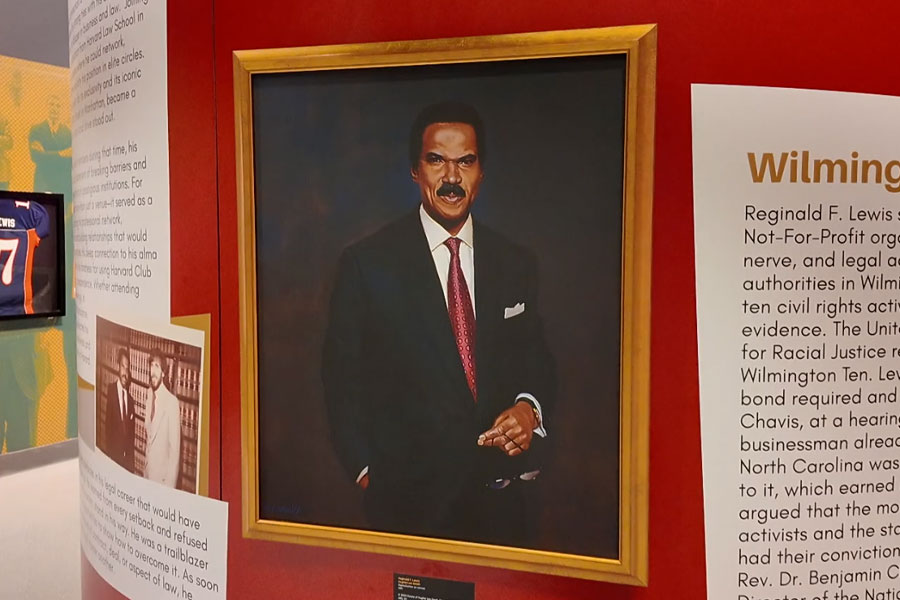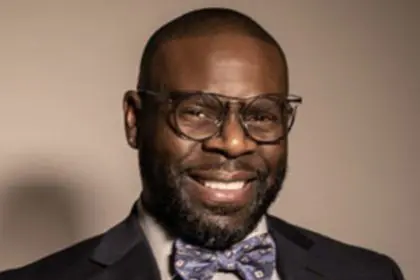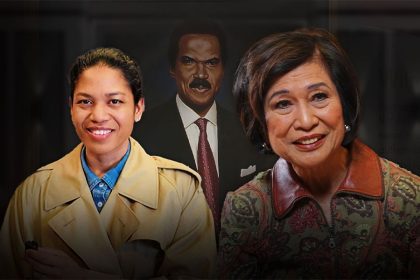Reginald F. Lewis, the visionary entrepreneur who orchestrated the largest offshore leveraged buyout in American history and became the first Black businessman to build a billion-dollar company, is being celebrated in a groundbreaking exhibition at the Reginald Lewis Museum in Baltimore. The exhibit, which opened February 8, 2024, offers an intimate look at the man who famously asked, ‘Why should white guys have all the fun?’ and went on to prove that success knows no racial boundaries. Through the eyes of his wife Loida Lewis and daughter Christina, we get a rare glimpse into the life of a man who transformed Wall Street and opened doors for generations of Black entrepreneurs.
What were the three defining characteristics that made Reginald Lewis successful?
Loida Lewis: First, he had goals, high goals, high dreams, he always set his goal, one of his aunts told me his goal was to become the richest Black man in America. Second, determination, tenacity, nobody can tell him you can’t do it. Third, faith, faith in his ability to achieve what he has set out.
How did courage and vision play a role in his success?
Loida Lewis: I think his courage is based on the injustice and inequality experienced by the Black community, by himself, and that’s why his book is a reflection of what he said to his grandparents when he was six, when they were talking about white jobs, good homes, Black people were excluded.
I think what impelled him is to show people the lie that when you are a person of color, a black man, you cannot achieve the highest dreams as any white man can be.
How did his experience at both an HBCU and Harvard shape his vision?
Loida Lewis: Being in a Black university, HBCU, historically Black colleges and universities, in the sense that he was among his people and to be able to pursue his dream. At HBCU, he studied economics, he enjoyed music, he loves jazz and modern music, but he also listened to opera, very eclectic.
What did the Harvard Law School experience prepare him for?
Loida Lewis: Even when he was younger, high school, college, he knew that if you want to be successful, Black or white, especially for the white, you’ve got to go to the Ivy League schools, and Harvard Law School has the stamp of success just by being in Harvard Law School. When he learned at Virginia State University in 1965 that Harvard Law School is inviting the top five students of HBCUs, he said, ‘I’m getting there.’
What was your perspective on his first major business deal?
Loida Lewis: When I knew that he was exceptional, when I left for the Philippines, just on the plane, I knew that I will never meet somebody like him again. I knew that he said early on, in fact, that was his honors mark at Harvard Law School, his term paper says, in order to create wealth, you have to do merger and acquisition, from the very top, he was a very successful lawyer.
How would you describe his presence in business settings?
Loida Lewis: First of all, he will not take any crap, and that’s what his grandfather says. Secondly, he did the work, he worked hard, as a practicing lawyer, he would come home late, and as his wife, it was my duty to see that he comes on an Oasis. It’s not like, ‘Why are you late again’, it’s ‘darling, have you eaten?’ ‘Do you want the massage?’ When he comes home, he drinks fresh water and so he can come out again and fight the monsters and dragons out there.
How did he approach reading and studying?
Loida Lewis: Yes, he read a lot, and then in fact, he would grade his books after reading it, B-, A+, C. He did read a lot, but he was very wide ranging in his reading, biographies, novels, and even technical books. When he failed three times to buy a company, it was not because they’re all racist, three fingers are pointing at him and he had the humility to say to himself, ‘I was not ready’, and so he read prospectuses, for him it was telling a story of how successful big companies becoming public. He read it like a novel and then he understood what was successful there.
They were not doing it alone, the three companies that he failed to buy, he was his own lawyer, his law firm, Lewis and Clarkson, he was his own investment banker and he was his own accountant, nobody was with him, he was all alone. So the next time McCall Pattern Company came, he hired an investment banker, that’s Phyllis Schless, he hired another accounting firm and he hired another group of lawyers so that they are all invested in his success.
What’s it like seeing his legacy preserved in this museum?
Loida Lewis: Before he died in 1993, he dictated to his aunt, the vice president then of the Reginald F. Lewis Foundation, ‘I want these 10 things when the company is sold. I want five million to be given to the African American Museum of History and Culture’.
20 years ago in 2005, when this was open to the public, I was just in tears because this was his dream, and now to have here, in this museum, the entire second floor to be about the legacy of Reginald Lewis, is just over the top. I am so glad to the program directors, to the staff, to those who made this possible.
What are some of the most touching moments in the exhibit?
Loida Lewis: There are so many things that they were able to find, high school, when he won over Polytechnic, the first encounter of a football team, Black high school, white high school, and his mother. What teared me up was the one on the family, that we were able to get all of those pictures of our happy times together, that was touching.
How important is the role of a supportive spouse in success?
Loida Lewis: Whether you are the Reginald Lewis, man or woman, sometimes it’s a woman who’s the rocket ship, the spouse, the significant other, has to be totally engaged, that your partner is going to the very top, and so you have to be very supportive. I understood that he’s going to be the rocket ship, he’s your Wagon to a Star, so I chose a job that’s nine to five, immigration lawyer with federal government. I knew also that he would be out there getting clients, working, so my own is, I am in charge of the two girls, Leslie and Christina.
The spouse has to embrace the ambition of the partner and be supportive. I don’t know the deal business, but I know you can do it. When your spouse, your partner comes home dejected, don’t kick him, just lift him up, that’s what they need.
Why was collecting art important to Reginald Lewis?
Loida Lewis: He loved art because it was exposed to him at Virginia State University, before he could afford the original artwork of Picasso, of George Brown, he would buy African American painters, Vincent Smith, Romare Burden, Jacob Lawrence, he bought postcards, that’s what he could afford, then he would place it in his office, as he moved off his desk, he would carry those postcards.
I think art is an expression of the divine in each one of us, when an artwork strikes something in this heart, then that’s it. For us human beings, when you look at good art, when you listen to good music, in a way, it’s our divine, the divinity in us.
What advice would you give to young people about perseverance?
Loida Lewis: First of all, I’d like to know, what are their dreams? I have to listen, you have to listen to the young person. Then just say, are you ready to work hard? Are you ready to accept defeat? Because do not confuse the first failure as the final defeat, don’t let failure discourage you, that’s how you learn.
Work hard, try, and get help, ask questions, don’t be scared and learn. Learn from your failure, look into yourself, be humble enough to see where were you lacking.
Why is it important for others to visit this exhibit?
Christina Lewis: Reginald Lewis is an icon of business and if you don’t know about him, know that all of the top Black entrepreneurs that you know, Black business people that you know, Black Wall Street founders and executives know about my dad, Reginald Lewis or as he was called by all his employees, Mr. Lewis. The exhibit here at the Lewis Museum, is the first ever solo exhibition focused on dad.
What can visitors expect to see at the exhibition?
Christina Lewis: Many people know him from his book, ‘Why Should White Guys Have All the Fun?‘, which is his autobiography and has sold over 100,000 copies since it was published in 1995. You can see an icon, my dad, a hero, but also a look back to Wall Street in the 1980s. He loved art, he had a huge extended family, you can see his car, you can see his clothes, you can even see his yearbook, and my favorite, you can sit here at a recreation of his desk, at the desk that he used when he was doing one of his biggest deal and soak in the power of a Wall Street Titan.

















